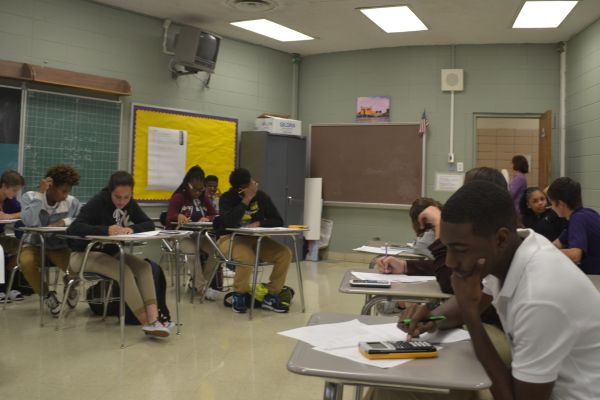Struggles Often Lead to Students’ Math Phobias

SOME STUDENTS SUFFER FROM A MATH PHOBIA — Algebra I students in Ms. Brazeale’s class strive to soar in math.
September 30, 2016
If you were to ask a random Central High School student what their least favorite school subject is, many would reply with “math.” To be such a common aspect of everyday life, mathematics are widely disliked for many reasons. Some people need more time to process new material, others do not see the significance of math, and there are students who are generally uninterested in the subject. As a result, people try to avoid math as much as possible, which induces a phenomenon that can only be described as “math phobia.” One would think that people tend to stray away from the topic because it is so complicated and specific, but recent studies have discovered that people with a math phobia actually do not hate the math component itself.
“The things that make math hard are variables, adding parts onto graphs, and memorizing all of the processes and rules,” listed freshman Monique Washington, who is currently enrolled in Jeff Mullin’s Algebra I course.
Rules play a key role in the math world since they determine how specific problems need to be solved. Every school year, new math terms are added on to previously learned knowledge to convert students to more complex branches of math, which include, but are not limited to, algebra, geometry, trigonometry, and calculus. Since math builds off of itself, students usually get behind in class if they cannot recall fundamental math material. Students lose a lot of new information over summer break, so it is important to review old math material before the start of a new school year.
“I look at review pages, read key terms, and ask my teacher or peers questions to help understand math better,” Washington adds, who spends about 15 minutes a day studying math, and generally maintains an A or B average.
With new methods of state testing, students are expected to know more than the answer to a problem. They are also required to explain how they arrived at their answer and why they used certain properties. This is the actual reason most people hate math since it requires critical thinking and a clear understanding of the topic.
It is common for students who have parents or family members that struggled with math in school to automatically assume they are bad at math
Geometry teacher Matt Joyner sees a lot of students make this mistake: “If they see any type of math, they shut their minds off without trying it because it is common for students, who have parents or family members that struggled with math in school, to automatically assume they are bad at math.”
Learning new information takes time, so it is not wise for students to base their ability off of bad experiences in the past.
“As is true with any fear, it gets worse if you don’t confront it. If you are afraid or nervous about math and don’t pursue math, your mind builds it up to be much worse than it is. The best thing to do with a big fear is work to confront it, so you can move on as a person,” suggests Algebra 2 and Pre-Calculus teacher Edward Potter.
Another reason some people think the hate math has to do with the way it is taught in our current educational system. Everyone learns best a different way, whether it be through a hands-on experiment, or hearing. Therefore, of course everyone will not be able to learn math well through memorizing formulas. Students believed that they would be able to get a better grasp on the concept if there were fun ways to connect math to their actual life, and they get more one-on-one time with their instructor.
Many teachers would not mind altering their teaching style to help their students retain this information better, but there is not much class time, and this would take some planning.
Regardless of a student’s stance on math, one will have to learn to accept it as part of your life. Math can be found all around us in the form of statistics, money, scores, and grades. When students have a positive mindset about learning math, improvements will eventually come.




